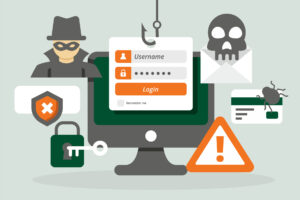With a little prep, you can shield your information online and secure your digital systems and devices.
As the new school year begins, there is excitement in the air for students, faculty, and staff. However, it’s essential to be aware of potential threats from hackers, identity thieves, and other malicious individuals who may exploit the busy nature of this time of year. Stay vigilant to protect yourself and your information.
Beware of common start-of-the-semester frauds.
- Emails supposedly containing “important information about your Trinity account” or a “problem with your registration.”
- Scams designed to cheat students out of money, such as scholarship scams, fake “tuition payment processors,” textbook rental or book-buying scams, housing scams, tutoring scams, and work-from-home scams. Discover how Trinity College combats scams and supports students to avoid being scammed.

- Beware of tech support scams that involve receiving a call from individuals claiming to be from reputable organizations such as “The College,” “the Service Desk,” “Microsoft,” or “Apple.” They may inform you of an issue with your computer.
- Beware of individuals posing as IRS representatives pressuring students or their parents to wire funds for a fictitious “federal student tax immediately.”
- It is important to remember that no one, except for you, should have access to your login information. Even if a message appears trustworthy, avoid sharing your passwords with anyone.
- Fake friend requests plague social media, and it’s essential to be cautious.
- Beware of emails containing fraudulent Microsoft, Box, DocuSign, or Google Doc notifications.
How to stay safe:
Adopting a healthy dose of skepticism when receiving unexpected messages, offers, or phone calls is essential to protect yourself from scams. You can develop this habit by:
- Always think twice before clicking on links or opening attachments, even if they look like someone you know. If you’re not sure, contact the sender by a method you know is legitimate to confirm they sent it.
- To safeguard yourself, it’s crucial to refrain from sharing personal information. Be aware that swindlers are skilled in impersonating others.
- Safeguard your passphrase (password) by creating lengthy and robust ones, keeping them confidential, and using unique passwords for each account. Furthermore, whenever feasible, utilize multi-factor authentication (MFA). Discover the Benefits of Using a Passphrase.
Additional resources:
- More on tech support scams: https://www.consumer.ftc.gov/articles/0346-tech-support-scams(link is external)
- The following information from the IRS is relevant and essential regarding the issue of fraudulent “federal student tax” (although it was released in 2016, it remains current): https://www.irs.gov/uac/newsroom/irs-warns-of-latest-scam-variation-involving-bogus-federal-student-tax(link is external)
- Scholarship scams: http://www.fraud.org/back_to_school_scams(link is external) (end of the article)
- Beware of scams related to processing tuition payments, which may still be circulating despite originating in 2016. https://www.forbes.com/sites/johnwasik/2016/09/11/scam-alert-avoid-college-payment-processors/
Learn More:
- Take the necessary steps to safeguard your privacy today.
- Protect yourself from phishing; learn to spot a phishing message with Microsoft
- Top News on Email Scams, Spoofing, and Phishing

